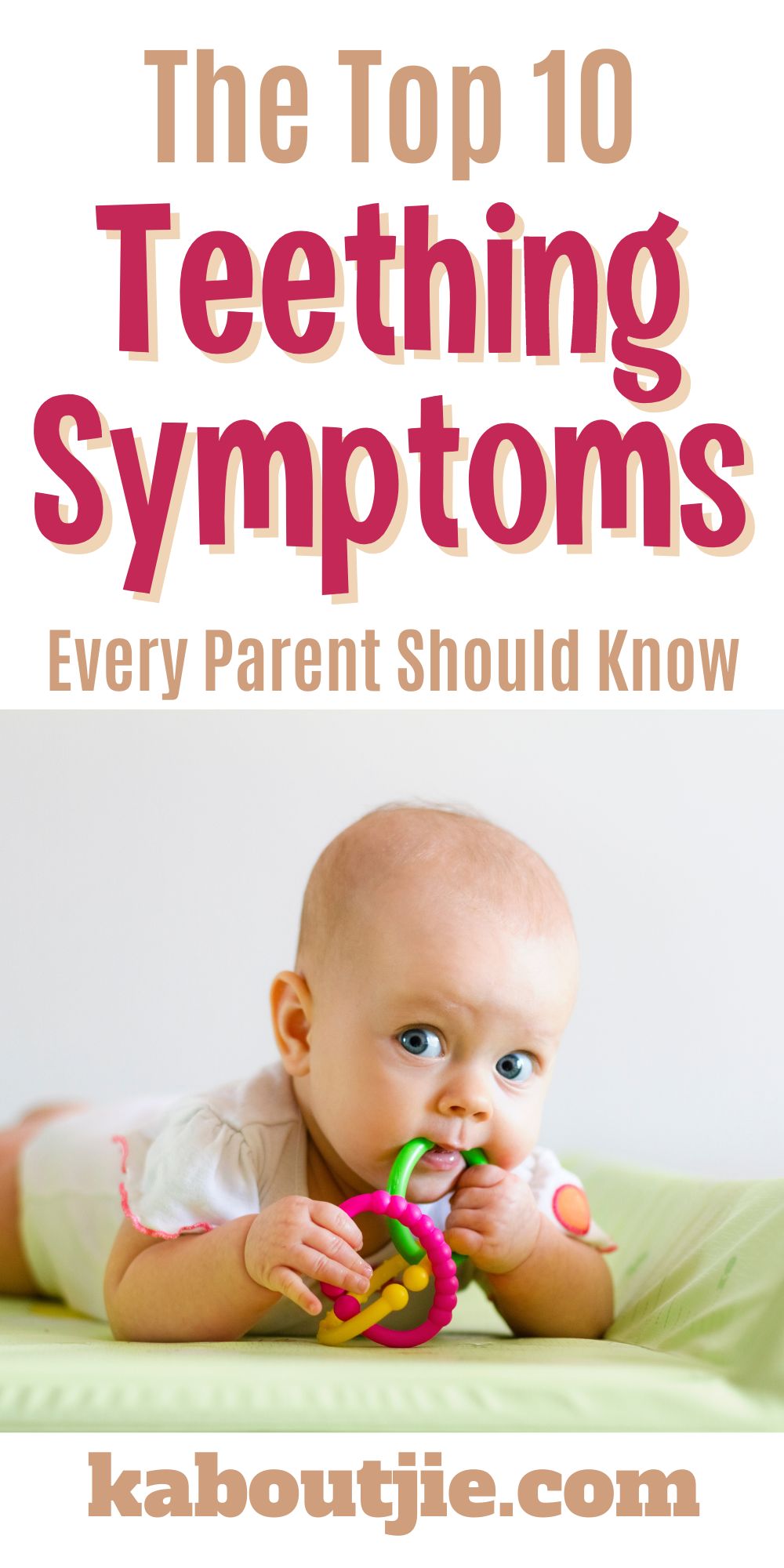Teething is a natural process that all babies go through, but it can be a difficult time for both the child and their parents. As teeth begin to emerge from the gums, babies may experience a range of symptoms that can cause discomfort and distress. Here are the top 10 teething symptoms to watch out for and some tips on how to soothe them.
***Disclosure -The links in this post may contain affiliate links and I may receive a small commission if you make a purchase after clicking on a link.***

Increased Drooling And Drool Rash
One of the most common teething symptoms is increased drooling, which can lead to a drool rash around the mouth and chin. To help prevent this, keep a bib or cloth handy to wipe away excess drool and apply a gentle moisturiser or barrier cream to protect the skin. You can also try giving your baby a teething toy or cold washcloth to chew on, which can help stimulate saliva production and relieve discomfort.
Irritability And Fussiness
Another common teething symptom is irritability and fussiness. Your baby may be more irritable than usual and have trouble sleeping or settling down. This is because teething can cause discomfort and pain in the gums, making it difficult for your baby to feel comfortable. To soothe your baby, try giving them a gentle massage on the gums with a clean finger or a teething toy. You can also try offering them a chilled teething ring or a cold washcloth to chew on, which can help numb the gums and provide relief.
Difficulty Sleeping And Night Time Waking
Teething can also disrupt your baby’s sleep patterns, causing them to wake up more frequently during the night. This is often due to the discomfort and pain in their gums, which can make it difficult for them to fall asleep and stay asleep. To help your baby sleep better, try giving them a warm bath before bedtime, using a white noise machine to create a soothing environment, and offering them a teething toy or chilled washcloth to chew on before bed. You can also talk to your paediatrician about using a pain reliever specifically designed for teething babies.
Loss Of Appetite And Refusal To Eat
One of the common teething symptoms is a loss of appetite or refusal to eat. This is because the pain and discomfort in their gums can make it difficult for them to chew and swallow food. To help your baby during this time, try offering them soft, easy-to-eat foods like pureed fruits and vegetables, yogurt, or mashed potatoes. You can also offer them cold foods like applesauce or chilled yogurt to help soothe their gums. It’s important to make sure your baby is still getting enough nutrients and fluids during this time, so talk to your paediatrician if you have concerns about their eating habits.

Chewing On Objects And Fingers
Another common teething symptom is excessive chewing on objects and fingers. This is because the pressure on their gums can help alleviate the pain and discomfort. To help your baby during this time, offer them safe and clean teething toys or a chilled washcloth to chew on. Avoid giving them small objects or toys that could be a choking hazard. It’s important to supervise your baby while they are chewing to ensure their safety.
High Temperature
A high temperature is a common symptom of teething, as the body responds to the inflammation and discomfort in the gums. If your baby’s temperature is above 38°C, it’s important to monitor them closely and seek medical advice if necessary. You can help reduce their temperature by giving them infant paracetamol or ibuprofen, but always follow the recommended dosage and consult with a healthcare professional first. Additionally, make sure your baby stays hydrated by offering them plenty of fluids.
Runny Stools
Runny stools or diarrhoea can also be a symptom of teething. This is because the increased saliva production during teething can affect the digestive system and lead to looser stools. However, if your baby has severe diarrhoea or if it lasts for more than a few days, it’s important to consult with a healthcare professional as it could be a sign of an infection or other underlying condition. In the meantime, make sure your baby stays hydrated by offering them plenty of fluids and consider using diaper rash cream to protect their skin from irritation.
Nappy Rash
Nappy rash is a common symptom of teething as the increased saliva production can lead to more frequent diaper changes and prolonged exposure to moisture. To prevent nappy rash, change your baby’s diaper frequently and use a barrier cream to protect their skin. If your baby does develop nappy rash, try using a diaper rash cream or ointment to soothe the affected area. If the rash persists or becomes severe, consult with a healthcare professional for further advice.
Sore Ears
Sore ears can be a symptom of teething as the pain can radiate to the ears. If your baby is pulling or rubbing their ears, it may be a sign that they are experiencing discomfort from teething. You can try using a warm compress or gently massaging the area around the ears to provide relief. If the pain persists or your baby develops an ear infection, consult with a healthcare professional for further advice.
Runny Nose
A runny nose is a common symptom of teething as the increased saliva production can cause congestion and runny noses. This can be uncomfortable for babies and may lead to difficulty breathing or sleeping. To help alleviate this symptom, you can use a saline nasal spray or drops to clear the nasal passages. It’s important to avoid using decongestants or other medications without consulting with a healthcare professional first.
 Kaboutjie SA Mommy Blogs by Lynne Huysamen
Kaboutjie SA Mommy Blogs by Lynne Huysamen





My baby is 6 months now and no teeth yet! Plenty of drool and chewy on everything though 🙂
My son got very ill each time a tooth pushed through 🙁 Nothing would help as it was high fevers and late nights
In my opinion some professionals are wrong about teething not causing runny stools. Everytime my son was cutting a tooth he would have a very acid runny tummy that would burn his skin in minutes.
My daughter also had terrible teething poops until she started wearing her amber teething necklace!
Sooooo its starting…..
Thanks for info Lynne xxx
Irritability & fussiness Was one of my little boys symptoms and drooling but not the rest so im lucky he got his 2 bottom tooth out while ago and mommy think top 2 wants to come out…so lets see so far so good im just glad his stool is normal like always no runny stools of any kind.
He would eat hands or anything i ended up buying him a rubber for children so he can eat it
My boy got his 2 bottom teeth at 6 months and his to top teeth just came out on 8 months being a proud mommy..these symptoms are so spot on can relate to most of them.